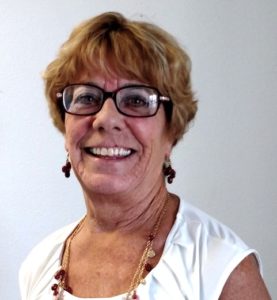The Reporters Committee for Freedom of the Press (RCFP) recently received a grant from the Knight Foundation to hire lawyers to provide pro bono legal support for journalists in up to five jurisdictions. The goal of the Washington-based nonprofit’s Local Legal Initiative is “to help local journalists and news organizations defend their rights to gather and report the news, gain access to public records and court proceedings, and hold state and local government agencies and officials accountable.”
 In the program’s initial test phase, RCFP will hire attorneys in 2020 for two-year terms. The deadline for proposals was Oct. 31.
In the program’s initial test phase, RCFP will hire attorneys in 2020 for two-year terms. The deadline for proposals was Oct. 31.The Nevada Press Association submitted a proposal on behalf of news organizations in Nevada. It was one of over 40 proposals RCFP received, so the odds are long that we’ll be selected. But NPA’s proposal has already had an impact on one reporter.
In order to demonstrate the need for pro bono legal support in the Silver State, we cited the case of Barbara Ellestad, a reporter based in Mesquite. Two days after our proposal was submitted, RCFP called Ellestad to learn more about the legal challenges she faced. After hearing her story, they decided not to wait until the winning proposals are announced early next year. They engaged a lawyer based in Las Vegas to provide Ellestad with immediate pro bono legal support.
The story we told in the proposal, about Ellestad’s years-long battle to report on the Virgin Valley Water District, is included below in a slightly edited version.
Barbara Ellestad is a veteran journalist who is now a freelance reporter for Battle Born Media’s weekly Mesquite Local News. In 2013-14, she owned the Mesquite Citizen Journal, a local news website. During the course of reporting for the website on related criminal and civil cases involving the local Virgin Valley Water District, Ellestad was served with six subpoenas in three different Clark County courts. Attorneys for the defendants asked for all of her reporting notes, documents, audio and video recordings, text messages, emails, and notes from phone calls. They contended she was not protected by Nevada’s shield law because the Citizen Journal was “merely an opinion blog” and not covered by the statute.

Ellestad hired local attorney Scott Halverson to fight the subpoenas, spending $27,000 of her own money on the effort. All six subpoenas were ultimately quashed and two of the judges ruled that online news reporters are covered by the shield law.
The two criminal cases resulted in convictions on 51 counts of conspiracy, extortion, money laundering, bribery and other illegal financial transactions, against both Water District employees who fraudulently sold water rights owned by the local utility. They were sentenced to three years in jail. In the civil case, the Water District recovered $8 million of the $12 million in water rights they had lost as a result of their employees’ criminal behavior. Many of Ellestad’s articles were cited in various court filings.
Halverson and the assistant district attorney who prosecuted the criminal case both told Ellestad the subpoenas were designed to harass and intimidate her, and to get her to stop reporting on the court cases.
Ellestad closed her news website in 2014. In her present capacity as a freelancer for the Mesquite Local News, she was served in June with another subpoena for articles she had written on a new civil lawsuit involving the Water District. The suit was filed by a local golf course owned by wealthy out-of-towners trying to stop the utility from raising their water rates. In addition to access to her reporting notes and records, plaintiffs’ attorneys want to depose her regarding her involvement with the Water District and the issues at the heart of the lawsuit. (She had served on the Water District Board of Directors for two years and resigned before the board considered raising water rates.) Battle Born COO and Mesquite Local News Publisher Kirk Kern was also subpoenaed.
Ellestad believes the subpoenas were issued to harass her and to stop her reporting. The city attorney and the Water District attorney both agree. But the Mesquite Local News has no access to legal counsel and this time Ellestad wasn’t prepared to dip into her own funds to fight her subpoena. So she and Kern responded by citing the shield law and asking plaintiffs’ lawyers to withdraw the subpoenas. Then they held their breath and waited. So far the plaintiffs’ attorneys have not responded. Meanwhile, Ellestad and the paper have continued reporting on the lawsuit.
Most reporters wouldn’t be willing to spend $27,000 of their own money to hire a lawyer. And most freelancers who receive a subpoena but don’t have legal counsel would fold. So the reporting Ellestad has done in Mesquite may not have seen the light of day if the subpoenas had been issued to a less-committed reporter or one who lacks Ellestad’s tolerance for risk. Her cases describe the kind of run-of-the-mill pressure tactics power brokers and their aggressive lawyers employ in Nevada to make reporters disappear. They’re less likely to disappear, of course, if they have the kind of pro bono legal support that can defend their reporting.
“Freelancers know they are ‘on their own’ when reporting,” says Ellestad. “It’s not that the newspaper owners aren’t concerned about journalistic integrity. They are. But with small newspapers like ours, they can’t afford massive legal bills either. Our publisher has never ‘killed’ a story based on these concerns but we have made him sweat more than a few times.”
Ellestad also told us about another freelancer named Teri Nehrenz, who recently wrote a tough article about a murder case a few miles outside of Mesquite, in Littlefield, Arizona. Nehrenz’s article raised questions about the victims’ son and daughter-in-law. They responded with a Facebook post threatening to sue her. Nehrenz is also currently investigating the Mesquite Chamber of Commerce. She was warned by local officials not to report on the organization because it “would be bad publicity for the community and the chamber.” Nehrenz has continued reporting on both stories but she is worried about the potential consequences.
“It is extremely intimidating knowing you can get caught up in legal issues even when you report the truth,” says Ellestad. “Having the support of a lawyer who can provide free legal advice would be a real fear-reducer and spine-stiffener for Nevada reporters.”
 Nevada Press Association The best in Nevada journalism since 1924
Nevada Press Association The best in Nevada journalism since 1924
